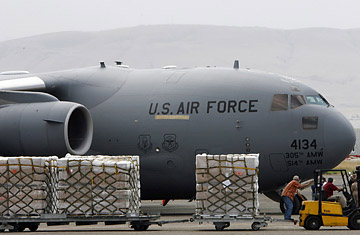
Workers unload humanitarian aid from a U.S. military cargo plane at Tbilisi airport.
It was hard to miss the contrast between President Bush's tough talk on Wednesday over Russia's intervention in Georgia, and the reality check offered by Defense Secretary Robert Gates a day later. While Bush promised that the U.S. military would rush relief supplies to Georgia and warned the Russians that Washington expected them to retreat from Georgian territory, Gates was careful to make clear that the U.S. has no desire to get involved in the fight between the Russian bully and its Georgian victim. "I don't see any prospect for the use of military force by the United States in this situation," Gates told reporters Thursday. "Is that clear enough?"
Bush had blasted Russia over reports of Russia's continuing offensive military operations after it had agreed to a ceasefire. The fact that he used the word reports four times, however, seemed to suggest that the White House lacked independent confirmation of what was happening on the ground in Georgia and — perhaps more significantly — that it didn't entirely trust what it was being told by its Georgian ally.
"We're concerned about reports that Russian forces have entered and taken positions in the port city of Poti, that Russian armored vehicles are blocking access to that port, and that Russia is blowing up Georgian vessels," Bush said. Gates, on Thursday, corrected the impression created by the President 24 hours earlier: "We have found that a lot of the initial reports that we have received on things going on in Georgia have not been accurate," the Defense Secretary said, diplomatically ignoring the fact that his boss had given those reports credence by reiterating them from the Rose Garden. "Our latest information, for example, is that the commercial port at Poti is intact and usable. And we think that the Russians never actually imposed a blockade."
Bush on Wednesday also said that he had ordered Gates to launch a "vigorous and ongoing" humanitarian mission "headed by the United States military" utilizing "U.S. aircraft as well as naval forces." That sounded ominous, especially after Saakhashvili declared that Bush's statement meant that U.S. forces would "take control" of Georgian ports and airfields to ensure the passage of aid, which could potentially have put them on a collision course with Russian forces. Pentagon spokesman Geoff Morrell quickly contradicted the Georgian leader. "We do not need nor do we intend to take over any air or seaports in order to deliver humanitarian assistance to those caught in this conflict," he said.
And by Wednesday night, the U.S. Navy was making clear that it had no ships headed toward the Black Sea. On Thursday morning, Gates made it clear that the humanitarian effort — limited so far to a pair of C-17s bringing shelter, clothing and medicine to Tibilisi — wasn't quite as brawny as the commander-in-chief had suggested. In fact, it is all happening "under the direction of the State Department," he noted.
As the Russian military wipes its hands after bloodying the U.S.-trained Georgian military, the world's lone remaining superpower will confine itself to dispensing humanitarian aid and rhetoric — neither speaking softly nor brandishing a big stick. Pentagon officials expect Russia to consolidate its gains of the past week, perhaps setting up permanent bases in the provinces of Abkhazia and South Ossetia and actually gobbling up additional Georgian territory outside the two provinces as security buffers.
And it was all so predictable: A frustrated Russian government feeling increasingly encircled as NATO's membership expanded steadily eastward, its coffers engorged by $110-a-barrel oil, facing a pesky neighbor — and former Russian imperial territory — cozying up to the United States and inviting U.S. troops in to train its soldiers. Whether or not Washington or Tbilisi could have avoided the Russian invasion, the very fact that the U.S. has no desire for war with Russia should have acted as a brake on Georgian President Mikhail Saakashvili's annual (since 2004) August skirmishes with pro-Moscow separatists in South Ossetia, which triggered last week's Russian invasion.
Despite the events in Georgia over the past week, it was business as usual between the U.S. and Russia on the Western front. The Bush Administration on Thursday signed a deal with Poland to build a missile-interceptor base there, despite bitter opposition from Moscow, which sees the plan as aimed at blunting its own nuclear deterrent — a charge the Pentagon dismisses. But in light of Russia's heavy-handed action in Georgia and the missed signals and conflicting reports surrounding it, this may not be the most auspicious moment to further enrage the neighborhood bully by deploying a dubious missile shield against a dubious threat.
